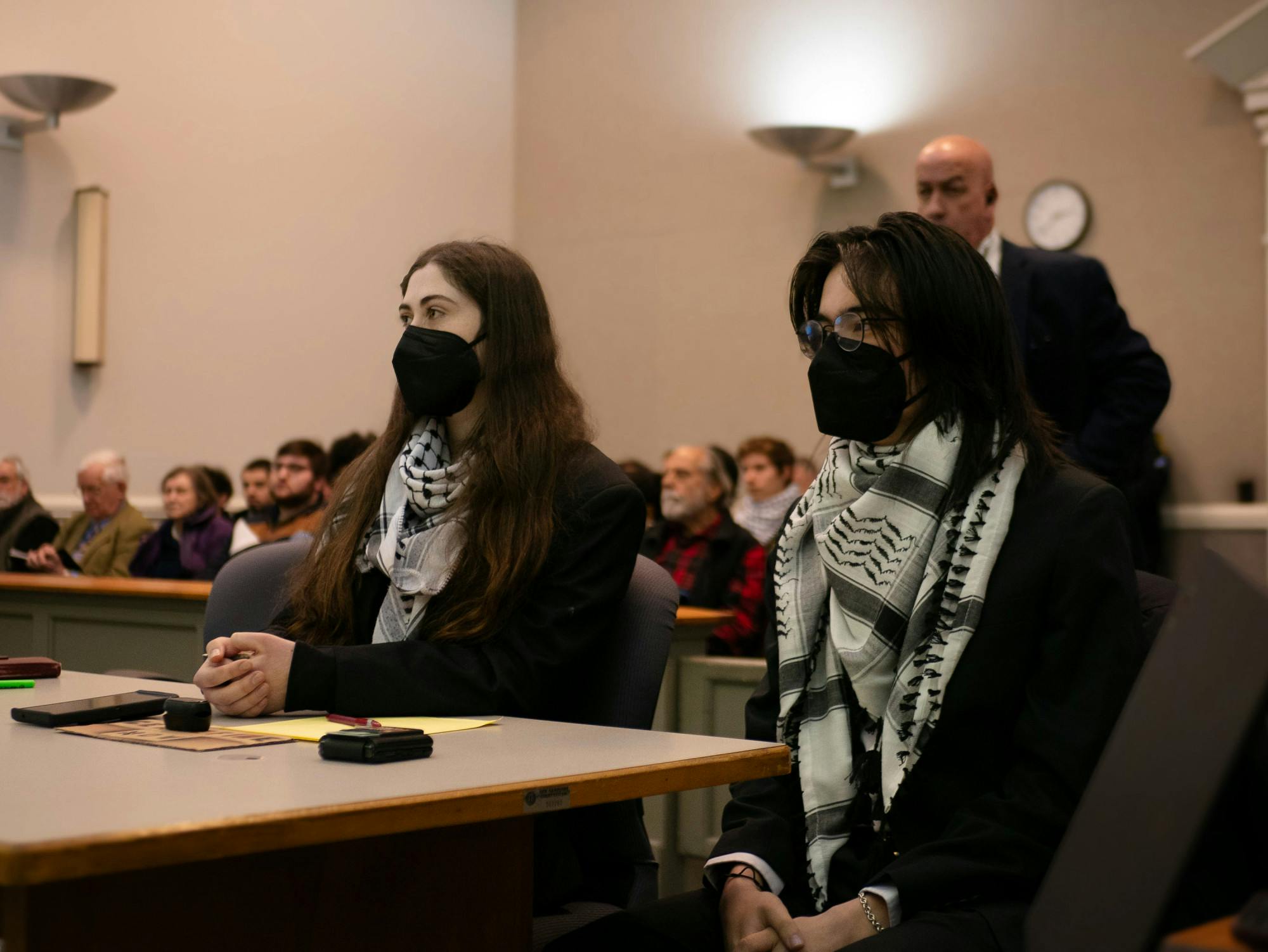On Feb. 26, Kevin Engel ’27 and Roan V. Wade ’25 appeared at the Lebanon District Court at 1 p.m., where they were tried for misdemeanor counts of trespassing. The trial, presided by District Court Judge Michael Mace, began an hour and a half late due to delays from earlier hearings that day. Dartmouth students and Upper Valley residents filled the courthouse, and the door remained open for people to listen in the lobby.
Engel and Wade were represented pro bono by Kira Kelley, who works for Climate Defense Project, an organization that “offers activist-friendly legal arguments and comprehensive legal support for climate justice,” according to its website.
The prosecution attorney Mariana Pastore called on several witnesses, including Department of Safety and Security director Keiselim Montás, Hanover Police Department Sergeant Matt Ufford, Lieutenant Michael Schibuola and patrol officer James Zeblisky. Pastore first called on Montás, who recounted his interactions with protestors, including Engel and Wade, in the week leading up to the Oct. 27 arrest.
A video taken by Montás on the night of Oct. 27 was shown at the trial, in which Montás gave a final warning to Engel and Wade that if they did not leave the tent, they would be officially trespassing and subject to arrest. In the video, Montás asked Engel and Wade to leave the tent and join the other protesters standing around the tent, which Engel and Wade did not do.
During the defense cross-examination of Montás, Kelley had Montás read the “Special Action” section of the Committee on Standards Conduct Sanctions. Kelley asked whether the arrest of the student protestors should have warranted a hearing from the Committee of Standards instead of calling the Hanover Police Department.
“So, the policy that you’re required to follow states that when the policy is violated, you take that violation to the Committee on Standards?” Kelley asked.
Montás replied that he did “not recall … that specific policy having that specific language.”
Pastore objected to the introduction of the Committee on Standards Conduct Sanctions into defense evidence. She claimed that “Dartmouth policy has no place here,” indicating that this trial remains outside of Dartmouth policy proceedings.
However, Kelley cited two court cases, Doe v. Brandeis and Nierenberg v. Trustees of Dartmouth College, which the defense used to argue that Engel and Wade were in a “contractual relationship” with the College. Therefore, the defense argued that the Committee on Standards alternative would have been viable over calling the Hanover Police Department.
Doe. v. Brandeis is a 2023 decision made by the United States District Court for the District of Massachusetts involving a former Brandeis University student who sought “monetary and injunctive relief against the university, alleging that it unlawfully adjudicated a sexual assault allegation filed against him,” according to Casetext. In Nierenberg v. Trustees of Dartmouth College, the New Hampshire Superior Court stated that “student handbooks and other materials may set out the terms of a contract between a university and its students.”
Mace sided with the defense, and the Committee on Standards Conduct Sanctions were introduced into evidence.
College President Sian Beilock’s lawyer Michael Delaney from McLane Middleton was in attendance, but he was sequestered — or asked to leave — by the defense. “The defense is planning on calling President Beilock when she recovers,” Kelley said. Beilock was notably absent from today’s proceedings.
At 3:30 p.m., the court took a 10-minute recess. Proceedings continued until 4 p.m., when the court adjourned for the day with intentions of resuming at a later date.
According to Engel and Wade, the defense and prosecution attorneys are communicating with the judge to schedule a follow-up date for the continuation of the trial.
“They said that hopefully, it would be within a couple [of] days,” Engel said.
Before the hearing, students gathered in front of the courthouse for the “Divest, Don’t Arrest Rally” in support of Engel and Wade. The courthouse allocated a portion of the parking lot for people to gather. There, several students and a member of Upper Valley for Palestine spoke to the crowd about their support for Engel and Wade as well as pro-Palestine activism.

Engel and Wade were initially arrested after submitting a document titled the Dartmouth New Deal to the administration, which called for the College’s divestment from Israeli “apartheid,” among other demands.
Jordan Narrol ’25, one of the hunger strikers, spoke on his Jewish heritage and family connection to the Holocaust. He used the phrase “Never again” — which encourages the remembrance of the Holocaust while advocating for the prevention of future genocide — and spoke of its significance for the Palestinian movement.
“Never again doesn’t mean never again for only us, it means never again for anyone,” Narrol said. “What we’re doing today is the most Jewish thing you can do.”
The hunger strikers, except for Wade and Paul Yang ’23, broke their fasts by consuming symbolic slices of watermelon. Wade and Yang plan to continue the hunger strike indefinitely.
In an interview after the trial, Engel explained that the watermelon is symbolic of the Palestinian flag for its red, green, black and white coloring. According to Engel, when the Palestinian flag was initially banned and censored in Israel, the watermelon became a “symbol for Palestinian resistance.”
“We were deciding ways to break the strike, and we ended up deciding that watermelon would be fitting because [of] the context of hunger striking and … hunger striking in and of itself is an important form of protest in Palestine,” Engel said.
Shortly after the trial began, Dartmouth Student Government sent an email statement to undergraduate students titled “DSG on Latest Developments in Student Arrests.” In their email, DSG wrote that they were “disheartened that these two students are being prosecuted,” given DSG’s position that “these students should not have been arrested given the alternatives available [on the night of their arrest].”
Student body vice president Kiara Ortiz ’24 was in attendance at the trial, along with other members of DSG.
Wade noted the support and presence of students before and during the trial.
“[Having] a trial and being criminalized, threatened, slandered, receiving hate comments and the hunger strike, has been very physically and emotionally exhausting,” Wade said. “I’m extremely lucky that we do have a robust support system. We have so many students who text us every day, making sure that we’re okay, letting us know if we need anything and that they’re there for us. I’m eternally grateful to everyone who’s shown support.”
The College clarified on Feb. 25 that it would not interfere in the legal proceedings. However, members of the College administration said they would continue to offer support and resources to the two students, according to an email from the Office of Communications.
The College declined to comment on Beilock’s absence and the ongoing trial.

Elle Muller is a ’24 from Tucson, Arizona. She is double majoring in English and creative writing & theatre. At The Dartmouth, she served as the news executive editor for the 180th Directorate. Before that, she wrote and edited for Arts. In addition to writing, Elle is involved with dance and theatre at Dartmouth.
Daniel Modesto ’24 is the News executive editor. He is from Brooklyn, New York, and is a Native American and Indigenous Studies major modified with Latin American, Latino and Caribbean Studies.




